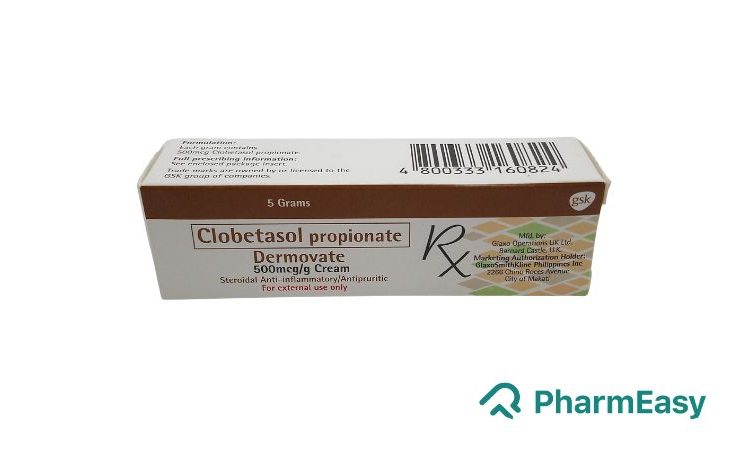Clobetasol Propionate Cream: Uses and Side Effects
By Dr. Mayuri Pandey +2 more

Get,

to manage your symptom
Get your,


4 Cr+ families
benefitted

OTP sent to 9988776655



You’ve successfully subscribed to receive
doctor-approved tips on
Whatsapp

Get ready to feel your best.

Hi There,
Download the PharmEasy App now!!


Register to Avail the Offer
Send OTPBy continuing, you agree with our Privacy Policy and Terms and Conditions

Hi There,
Sign up on PharmEasy now!!
Trusted by 4 crore+ families

OTP sent to 9988776655



You have unlocked 25% off on medicines




Code: NU25
By Dr. Mayuri Pandey +2 more
Table of Contents
If you’re looking for a powerful solution to treat and manage your skin conditions, then clobetasol propionate cream may be the answer. Clobetasol propionate cream is a medication used to alleviate symptoms such as itching, redness, dryness, crusting, scaling, inflammation, and discomfort associated with various scalp and skin conditions, including psoriasis and eczema.1
Read on to learn more about the benefits clobetasol propionate cream has to offer!

Clobetasol propionate cream is a potent corticosteroid used to treat various inflammatory skin conditions such as:
It helps reduce inflammation, relieve itching and redness, and suppress the immune response. However, it should be used only as prescribed by a healthcare professional to avoid potential side effects.2
Clobetasol propionate cream works with the help of corticosteroids to calm down irritated skin. These corticosteroids help reduce inflammation, redness, and itching of the skin. When you apply clobetasol propionate cream on your skin, it shrinks the blood vessels. This in turn stops the release of irritating substances and decreases the production of certain cells that cause inflammation. This helps to soothe the skin and promotes skin healing. Clobetasol propionate cream may be potent and effective in the management of moderate to severe skin conditions and is typically used for short-term and intermittent use under the guidance of a healthcare professional. It’s important to use clobetasol propionate cream as directed by your doctor to get the best results and avoid any potential side effects.3
If you are using clobetasol propionate cream for the first time, it’s important to follow these instructions to ensure proper application:
Here are some precautions to consider before using clobetasol propionate cream:
It is very important to note that excessive clobetasone cream usage in children can cause growth disturbances due to adrenal supression.
Dr. M.G. Kartheeka, MBBS MD(Pediatrics)
The possible side effects of clobetasol propionate cream are:
It is important to inform your doctor about any side effects or concerns you may have while using clobetasol propionate cream for proper evaluation and management.1
Use of topical steroid cream should be under medical supervision as it may cause skin thinning, stretch marks, rashes, redness and increased hair growth on prolonged use.
Dr. Ashish Bajaj, M.B.B.S. M.D. in Clinical Pharmacology and Toxicology.
Store the clobetasol propionate cream at room temperature and avoid freezing it.1
Yes, clobetasol propionate cream can be used for eczema.1
Yes, clobetasol propionate is a steroid cream.2
It may take about 2 to 4 weeks for clobetasol propionate cream to work.4
No, clobetasol propionate should not be used on the face.7
1) Clobetasol topical: Medlineplus Drug Information [Internet]. MedlinePlus. U.S. National Library of Medicine; Available from: https://medlineplus.gov/druginfo/meds/a686008.html
2) About clobetasol [Internet]. NHS choices. NHS; Available from: https://www.nhs.uk/medicines/clobetasol/about-clobetasol/
3) Clobetasol propionate [Internet]. National Center for Biotechnology Information. PubChem Compound Database. U.S. National Library of Medicine; Available from: https://pubchem.ncbi.nlm.nih.gov/compound/32798#section=Mechanism-of-Action
4) How and when to use clobetasol [Internet]. NHS choices. NHS; Available from: https://www.nhs.uk/medicines/clobetasol/how-and-when-to-use-clobetasol/
5) Clobetasol propionate cream, USP, 0.05% clobetasol propionate ointment, USP, 0.05% [Internet]. U.S. National Library of Medicine. National Institutes of Health; Available from: https://dailymed.nlm.nih.gov/dailymed/fda/fdaDrugXsl.cfm?setid=fb29b17b-96af-4a78-bc91-83cf8c5c2b1d&type=display
6) Clobetasol (topical application route) proper use [Internet]. Mayo Clinic. Mayo Foundation for Medical Education and Research; 2023. Available from: https://www.mayoclinic.org/drugs-supplements/clobetasol-topical-application-route/proper-use/drg-20073860?p=1
7) Stewart M. Clobetasol propionate & Clobetasol Propionate Cream [Internet]. Patient.info. 2021. Available from: https://patient.info/medicine/clobetasol-propionate-for-severe-inflammatory-skin-conditions-clobaderm-dermovate-etrivex
8) Using clobetasol with other medicines and herbal supplements [Internet]. NHS choices. NHS; Available from: https://www.nhs.uk/medicines/clobetasol/using-clobetasol-with-other-medicines-and-herbal-supplements/
9) Dhar S, Seth J, Parikh D. Systemic side-effects of topical corticosteroids. Indian journal of dermatology. 2014 Sep;59(5):460. Available from: https://www.ncbi.nlm.nih.gov/pmc/articles/PMC4171913/
Disclaimer: The information provided here is for educational/awareness purposes only and is not intended to be a substitute for medical treatment by a healthcare professional and should not be relied upon to diagnose or treat any medical condition. The reader should consult a registered medical practitioner to determine the appropriateness of the information and before consuming any medication. PharmEasy does not provide any guarantee or warranty (express or implied) regarding the accuracy, adequacy, completeness, legality, reliability or usefulness of the information; and disclaims any liability arising thereof.
Links and product recommendations in the information provided here are advertisements of third-party products available on the website. PharmEasy does not make any representation on the accuracy or suitability of such products/services. Advertisements do not influence the editorial decisions or content. The information in this blog is subject to change without notice. The authors and administrators reserve the right to modify, add, or remove content without notification. It is your responsibility to review this disclaimer regularly for any changes.

Leave your comment...
Comments